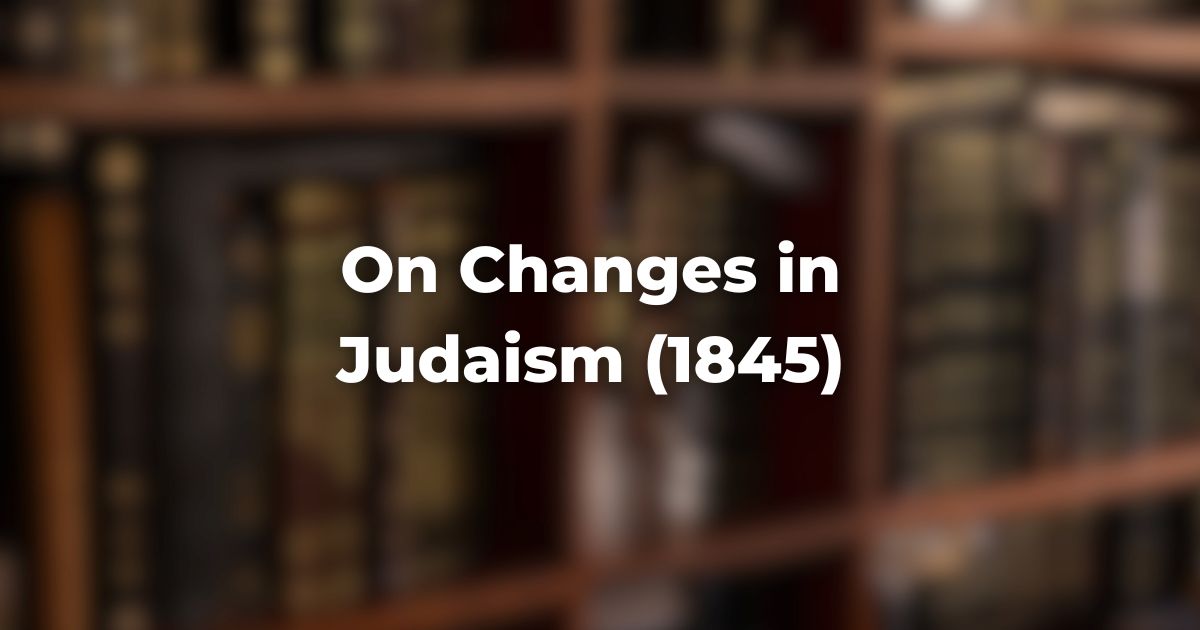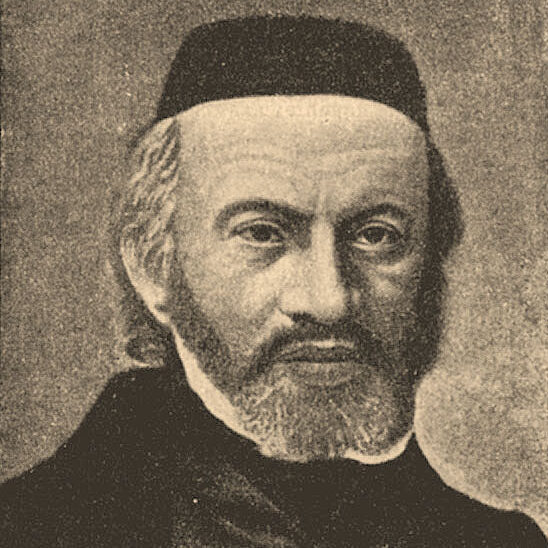This is a part of our “Core Conservative Judaism Ideas” series and believe this piece offers something substantial to the understanding of Judaism and Conservative Judaism.
“In 1844 [Rabbi Zecharias Frankel] initiated a monthly publication called ‘Zeitschrift für jüdische religiöse Interessen’ which continued for three years and which, infrequently polemic fashion, gave expression to his views on Judaism.
The article printed below is a translation, in condensed form, of the lead article in the second volume of the Zeitschrift which was published in 1845, and reflects both Frankel’s involved style and the tenor of his thinking.”
The language and style may reflect the time it was written.
The piece has been reformatted for readability and edited for length. Originally republished in the book Tradition and Change. Headings added by the editor.
Editor’s Summary of Main Points
- Because Judaism is a religion of action rather than abstraction and that it must be lived and felt, then we must attempt to maintain “the integrity of Judaism simultaneously with progress.”
- Frankel offers the existence of a third “party” in Judaism. This is where Conservative Judaism draws its roots. This stream of Judaism “bases itself on rational faith…religious action, but it demands that this action shall not be empty of spirit…”
- Judaism changes over time, as proven through the example of the transformation from a literal understanding of “an eye for an eye” to a financial compensation model. This and other examples show that Judaism can and does change, leading to the question of how changes should be managed.
- Frankel highlights that the people have a significant role in how changes in Judaism are accepted or rejected rather than through the authority of rabbis and scholars alone. Changes must be made in relationship with the Jewish people.
On Changes in Judaism (1845)
The purpose of the Zeitschrift is the reconciliation of belief and life, the assurance of progress within our faith, and the refining and regenerating of Judaism from and through itself. This is the circle in which our effort must move. Anything outside this circle ceases to be Judaism. Those to whom even this circle seems to be extensive, incline to stagnation and oppose the demands of life and its activity.
For centuries Judaism has engaged in a successful struggle with the world. Through the ages Judaism has shed its light abroad and illumined the way of many nations who even today, whether consciously or unconsciously, make use of its enlightenment.
Not in vain did Judaism oppose paganism, materialism, sensuality, and the striving after earthly things. Through many generations Judaism sustained and guarded the sparks of divine spirit, and in helping them to develop, developed itself. Shall we assume that its power is now exhausted and consumed, that its living high spirit has lost its force? Does the spirit of the age really rise against it with might and strength?
How Does Judaism Navigate Progress?
Maintaining the integrity of Judaism simultaneously with progress, this is the essential problem of the present.
Can we deny the difficulty of a satisfactory solution?
Where is the point where the two apparent contraries can meet?
What ought to be our point of departure in the attempt to reconcile essential Judaism and progress and what type of opposition may we expect to encounter?
How can we assure rest for the soul so that it shall not be torn apart or be numbed by severe doubts while searching for the warm ray of faith, and yet allot to reason its right, and enable it to lend strength and lucidity to the religious feeling which springs from the emotions. The opposing elements which so seldom are in balance must be united and this is our task.
In order to find the way for uniting them, we must consider both the starting point and the aim of the movement which seeks this reconciliation.
Even in advocating social and political change one must think of the starting point and the goal. Usually the former is the situation as it is, while the latter is the situation as it should be. The aim can be arrived at by reflection and definition, but the starting point is rooted in life relations. Both elements must be properly understood and valued in order to determine the chain of activity and thought which will lead from “what is” to “what ought to be.”
In religious matters there is in addition to the starting point also an inner force which must be reckoned with and added to the mere statement of “what is.” To be understood, religion must be lived and deeply felt. And if we want to determine the measure for a discreet progress and change, we must first of all have a clear conception of the point of departure, namely Judaism itself.
What is Judaism?
Judaism is a great historical truth and its role in world history cannot be minimized either through mistaken dialectical interpretation or through prejudiced polemic.
Judaism contains, at its core, the highest teachings about God, His attributes, and doctrines, about the existence of man, his goal in life and the nature of his activity. To the Jew his God is a personal and an extra-mundane Being, and yet One who is within the world; nay more, even One who lives within his heart, for whom the right name is “Father.”
The beautiful expression of the Bible: “You are children of your eternal God” (Deut. 14:1) was conceived by Judaism in a warm and profound sense. The loving relation between father and children became the essence of the whole complex of its faith and formed the corner and the capstone of its spiritual structure. To this fundamental thought embodied in the Scriptures in brief dry sentences, there is added an oral tradition which breathes warmth and gentleness about the relation between the Jew and his God.
This tradition is filled with the awareness of God and in consequence embodies a truth the value of which cannot in any way be lessened or be made light of.
Judaism ties its teachings to divine revelation, which is an expression of the highest will of God. The eternal truths regarding the Godhead and morality flow from this source, and around these there are grouped other laws which are saturated with the same spirit, and in which the high ideas of the nobility of man and his closeness to God find expression. These revealed laws are the guardians of Judaism, the never-slumbering watchman of the holiest elements within it. They are designed to protect the highest truths and they have faithfully carried out this mission to the present day.
These laws have one of two purposes.
Some have the purpose within themselves, though it may not always be clearly evident in each particular law. Thus the dietary laws aim at cultivating restraint of appetite; the sexual laws at inculcating chastity and purity of morals.
Other laws which mirror the power of God as the creator have another function- to remind man of God. Through their practice man is enabled to bind himself to the divine and enable the spiritual and the heavenly within him to gain victory over the earthly and the beastly in his character.
It is clear that man can apprehend the highest ideas meaningfully, only by means of sense data. Ideas are not always presented or apprehended with clarity. Men cannot rise to lofty complicated ideas at will, and frequently, in the whirl of life, these ideas are entirely lost to the mass of men. Abstraction and mere contemplation are not enough. The soul must have experience of sensation and reverence; the idea must clothe itself in a body, else it is lost to man. To prevent this loss is one of the aims of the precepts. They express recognition of, and reverence for, the divine will; they themselves become spiritualized and carriers of spiritual impulses.
Judaism is a Religion of Action
Again, Judaism is a religion which has a direct influence on life’s activity. It is a religion of action, demanding the performance of precepts which either directly aim at ennobling man or, by reminding man of the divine, strengthen his feelings of dependence on God.
And because of this trait neither pure abstract contemplation nor dark mysticism could ever strike root in Judaism. This, in turn, guaranteed that the lofty religious ideas were maintained in their purity, with the result that even today the divine light shines in Judaism.
By emphasizing religious activity, Judaism is completely tied to life and becomes the property of every individual Jew.
A religion of pure ideas belongs primarily to the theologians; the masses who are not adapted to such conceptions concern themselves little with the particulars of such religions because they have little relationship to life. On the other hand, a religion of action is always present, demanding practice in activity and an expression of will, and its demands are reflected in the manifold life of the individual, with the result that the faith becomes the common property of every follower.
The “Current” State of Judaism [in the 1840s]
Thus we have reached the starting point for the consideration of the current parties in Judaism.
The viewpoint of the Orthodox party is clear. It has grown up in pious activity; to it the performance of precepts is inseparable from faith, for to it, the two are closely and inwardly connected. Were it to tear itself away from observance and give up the precepts, then it would find itself estranged from its own self and feel as though plunged into an abyss.
Given this viewpoint, the direction and emphasis of the Orthodox party is clear. Where else, save in the combination of faith and meticulous observance of the precepts, can it find that complete satisfaction which it has enjoyed in the heritage of the fathers? When it will reject that which it has so long kept holy and inviolable? No – that is unthinkable.
Against this party there has arisen of late another one (Reform) which finds its aim in the opposite direction. This party sees salvation in overcoming the past, in carrying progress to the limit, in rejecting religious forms and returning merely to the simple original ideas.
In fact, we can hardly call it a party in Judaism, though its adherents still bear the name Jew, and are considered as such in social and political life, and do not belong to another faith. They do not, however, belong wholly to Judaism, for by limiting Judaism to some principles of faith, they place themselves partly outside the limits of Judaism.
The Third Party of Judaism
We will now turn to a third party which has arisen from the first party, and not only stands within the bound of Judaism, but is also filled with real zeal for its preservation and endeavors to hand it over to its descendants and make it the common good of all times.
This party bases itself upon rational faith and recognizes that the task of Judaism is religious action, but it demands that this action shall not be empty of spirit and that it shall not become merely mechanical, expressing itself mainly in the form.
It has also reached the view that religious activity, itself, must be brought up to a higher level through giving weight to the many meanings with which it should be endowed. Furthermore, it holds that we must omit certain unimportant actions which are not inherently connected either with the high ideas or with the religious forms delineated by the revealed laws. We must, it feels, take into consideration the opposition between faith and conditions of the time.
True faith, due to its divine nature, is above time, and just as the nobler part of man is not subjected to time, so does faith rise above all time, and the word which issued from the mouth of God is rooted in eternity. But time has a force and might which must be taken account of. There is then created a dualism in which faith and time face each other, and man chooses either to live beyond time or to be subjected to it.
It is in this situation that the Jew finds himself today; he cannot escape the influence of the conditions of the time and yet when the demands of faith bring him to opposition with the spirit of the time, it is hoped that he will heed its call- find the power to resist the blandishments of the times.
This third party, then, declares that Judaism must be saved for all time. It affirms both the divine value and historical basis of Judaism and, therefore, believes that by introducing some changes it may achieve some agreement with the concepts and conditions of the time.
Changes in Judaism
In order to have a conception of what changes should and can be introduced, we must ask ourselves the question — does Judaism allow any changes in any of its religious forms? Does it consider all of them immutable, or can they be altered?
Without entering into the citation of authorities pro and con, we may point out that Judaism does indeed allow changes.
The early teachers, by interpretation, changed the literal meaning of the Scriptures; later scholars that of the MishnahA collection of rabbinic teachings edited in Israel around 225 CE. Organized in six sedaraim by subject matter and dealing with both ritual and civil law. Both the Jerusalem and Babylonian Talmud are expansive discussions of the Mishnah. Read more, and the post-Talmudic scholars that of the TalmudReferring to one of two collections, the Jerusalem and Babylonian Talmuds, edited in the 6th century, that contains hundreds of years of commentary, discussion, and exploration of the ideas in the Mishnah. One could describe it as Mishnah + Gemara = Talmud Read more. All these interpretations were not intended as idle speculation. They addressed themselves to life activities and imparted different forms to the practice of certain precepts. Thanks to such studies, Judaism achieved stabilization and avoided estrangement from the conditions of the time in various periods.
Not in vain was the day declared a festival when the Pharisees overcame the Sadducees and ruled that the Biblical statement “An eye for an eye, a hand for a hand” was not to be taken literally, but was designed merely to indicate that the proper compensation should be imposed for such injury (Megillat Taanit, Ch. 4). This was a triumph not because of the humanitarian interpretation that it proposed, but, mainly, because it led to the establishment of the principle that the letter of the law is not decisive, but rather that the spirit must animate the law and raise it to a divine status worthy to become a norm to man who is himself endowed with spirit.
The teachers of the oral law supported such interpretations in a number of cases. But on the other hand, they established a rule which was intended as a guardian and protector against undue changes. It reads as follows: That which was adopted by the entire community of Israel and was accepted by the people and became a part of its life, can not be changed by any authority (AvodahOriginally understood as Temple service, but expanded to mean any service to God.
Related to: gemilut hasadim. See Pirkei Avot 1:2 Read more Zarah 36).
In this fundamental statement there lies a living truth. Through it there speaks a profound view of Judaism which can serve for all times as a formula for needed changes and can be employed both against destructive reform and against stagnation.
This fundamental statement helps to make clear to us what changes in Judaism are justified and how they can be realized. True, Judaism demands religious activity, but the people is not altogether mere clay to be molded by the will of theologians and scholars. In religious activities, as in those of ordinary life, it decides for itself. This right was conceded by Judaism to the people.
At such times as an earlier religious ordinance was not accepted by the entire community of Israel, it was given up. Consequently, when a new ordinance was about to be enacted it was necessary to see whether it would find acceptance by the people. When the people allows certain practices to fall into disuse, then the practices cease to exist. There is in such cases no danger for faith.
A people used to activity will not hurt itself and will not destroy its practices. Its own sense of religiosity warns against it. Only those practices from which it is entirely estranged and which yield it no satisfaction will be abandoned and will thus die of themselves. On the whole there is always a great fund of faith and religious activity to afford security against negation and destruction.
We have, then, reached a decisive point in regard to moderate changes, namely, that they must come from the people and that the will of the entire community must decide. Still, this rule alone may accomplish little.
The whole community is a heavy unharmonious body and its will is difficult to recognize. It comes to expression only after many years. We must find a way to carry on such changes in the proper manner, and this can be done by the help of the scholars.
Judaism has no priests as representatives of faith nor does it require special spiritual sanctimoniousness in its spokesmen. The power to represent it is not the share of any one family, nor does it pass from father to son. Knowledge and mastery of the law supply the sanctity, and these can be attained by everybody. In Jewish life, spiritual and intellectual ability ultimately took the place of the former priesthood which, even in early times, was limited in its function primarily to the sacrificial cult.
Even in early days, Judaism recognized the will of the people as a great force and because of this recognition a great religious activity came into being. But this activity, in turn, was translated into a living force by the teachers of the people through the use of original ordinances and through interpretation of the Scriptures. At times these actions of the sages lightened the amount of observance; at times they increased it. That the results of the studies and research of the teachers found acceptance among the people proves, on the one hand, that the teachers knew the character of their time, and, on the other hand, that the people had confidence in them and that they considered them true representatives of their faith.
Should Jewish theologians and scholars of our time succeed in acquiring such a confidence, then they will attain influence with the introduction of whatever changes may be necessary. The will of the community of Israel will then find its representatives and knowledge will be its proper exercise.
The Duty of Scholars
The scholars thus have an important duty in order to make their work effective. It is to guard the sense of piety of the people and to raise their spirit to the height of the great ideas. For this they need the confidence of the people.
Opposition to the views of the people, such as some reformers display, is unholy and fruitless. The teacher thereby loses the power to make the essence of faith effective, for in place of that confidence which is the basis in correct relations between teacher and community there comes mistrust and an unwillingness to follow.
The truths of faith must be brought nearer to the people so that they may learn to understand the divine content within them and thus come to understand the spiritual nature and inner worth of the forms which embody these truths. Once the people are saturated with an awareness of the essential truths and the forms which embody them, a firm ground will have been established for adhering to Jewish practices. And if the people then cease to practice some unimportant customs and forms of observances it will not be a matter of great concern.
And it will not, as recent changes have, lead some Jews into shock and hopelessness. They will no longer see all such changes as leading to the disappearance of our faith and spelling, as their pusillanimity leads them to believe, the end of the existence of Judaism.
Adapted from Tradition and Change.
Author
-

Zacharias Frankel (1801-1875), who is generally regarded as the ideological founder of the Conservative movement in Judaism, was one of the chief figures in Jewish historical-legal research in 19th century Germany. He served as rabbi in Dresden and later in Berlin and then for twenty-two years was head of the newly founded Rabbinical Seminary in Breslau. There he instructed a generation of rabbis in his own view of Judaism, which combined an emphasis upon tradition with a recognition that Judaism was facing a series of problems in his time. He looked for succor to diligent research into Jewish sources and to a recognition of the historical-growth character of Judaism. While he participated in the Frankfort Rabbinical Conference of 1845 which was summoned by the growing Reform movement, he was a vigorous opponent of Reform and contested some of its extravagances at this conference.
View all posts






